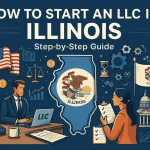When you’re starting a business, one of the first decisions to make is what type of business structure to use. Two of the most common options for small businesses are a sole proprietorship or an LLC (Limited Liability Company). Each has its own advantages and drawbacks. A sole proprietorship is the simplest form of business — it’s essentially just you, operating the business as an individual with no separate legal entity. An LLC, on the other hand, creates a distinct legal entity for your business, separate from you personally.
In this article, we’ll compare LLC vs sole proprietorship across key factors like liability protection, taxation, costs, and management. By understanding the differences (and the pros and cons of each), you can decide which structure suits your needs best.
Liability Protection
Liability is one of the biggest differences between an LLC and a sole proprietorship. With a sole proprietorship, there is no legal separation between you and your business. That means if your business incurs debt or gets sued, your personal assets (such as your bank accounts, car, or home) could be used to pay business liabilities. In contrast, an LLC provides personal liability protection. The LLC is a separate legal entity, so in most cases, creditors of the business or people who sue the business can only go after the LLC’s assets – not your personal property. This “corporate veil” isn’t absolute (you must run your LLC properly and not mix personal and business funds to maintain protection), but it is a major advantage of the LLC structure. In short, if limiting personal risk is a top priority for you, an LLC is likely the better choice.
Taxation
When it comes to taxes, sole proprietorships and LLCs share some similarities, but there are also differences in flexibility. By default, a sole proprietorship and a single-member LLC are taxed in essentially the same way. The business’s income is reported on the owner’s personal tax return (Schedule C for a sole prop, or Schedule C for a single-member LLC as well since it’s a “disregarded entity”). There’s no separate federal business tax return for a sole proprietor or a single-member LLC, which keeps things straightforward. Multi-member LLCs by default are taxed like partnerships, with the business filing a partnership return and issuing K-1 forms to each owner to report their share of profit on personal taxes.
One key advantage of an LLC, however, is tax flexibility. An LLC can choose to change its default tax treatment by electing to be taxed as an S-Corporation or even a C-Corporation if it makes financial sense. This is something a sole proprietorship cannot do (since a sole proprietorship isn’t a legal entity separate from the owner). For example, if your LLC’s profits grow, you might elect S-Corp status to potentially save on self-employment taxes by paying yourself a salary and taking additional profit as distributions. Keep in mind, S-Corp election comes with added paperwork and requirements. In terms of other taxes, both sole proprietors and LLC owners need to pay self-employment taxes (Medicare and Social Security) on their earnings, and both may need to pay state and local business taxes or fees depending on the jurisdiction. Some states do charge LLCs annual franchise taxes or reporting fees that sole proprietorships don’t have. So, while day-to-day tax obligations are similar, the LLC offers more options to tailor your tax strategy as your business grows.
Formation and Ongoing Formalities
Setting up and maintaining a sole proprietorship is typically easier and cheaper than an LLC. If you choose to be a sole proprietor, you don’t have to file formation documents to create the business itself – it automatically exists once you start doing business. You might need a local business license or to file a “Doing Business As (DBA)” name registration if you’re using a name other than your personal name, but these are usually minor steps. There are generally no state formation fees for a sole proprietorship (aside from any local licenses).
Forming an LLC, however, does require paperwork and fees. You must file Articles of Organization with your state and pay a formation fee which can range from $50 to a few hundred dollars depending on the state. The LLC also needs a registered agent and should have an operating agreement drafted. These steps involve some effort or cost, especially if you hire help or use a formation service (which can still be very affordable). Additionally, LLCs often have ongoing requirements. Many states require LLCs to file an annual report and pay a small fee each year to remain in good standing. Some states impose an annual franchise tax or LLC tax. Sole proprietorships do not have these specific requirements, making them a bit more maintenance-free.
On the other hand, the ongoing formalities for an LLC are still much fewer than those for a corporation. You won’t need to hold formal annual meetings or issue stock. In practice, once your LLC is set up, the ongoing tasks (like an annual report) are usually minimal, but it is an extra step to be aware of when comparing to a sole prop.
Ownership and Management
In a sole proprietorship, there’s just one owner (you), and you have complete control over all decisions. If you want to bring in a partner, you can’t continue as a sole prop; you’d either form a partnership or another entity (like converting to an LLC or corporation). An LLC offers much more flexibility in ownership. You can have one owner (single-member LLC) or many owners (multi-member LLC). You can also structure the management of an LLC in different ways. LLCs can be member-managed (owners manage day-to-day operations) or manager-managed (you can appoint one or more managers, who might be owners or outside persons, to run the business). This flexibility allows an LLC to accommodate multiple partners, investors, or a growing team, whereas a sole proprietorship is inherently limited to a single owner model.
Transferring ownership is also simpler with an LLC. You can sell or assign your membership interest in an LLC (subject to any rules in the operating agreement or state law). For a sole proprietorship, the business’s assets can be sold, but there’s no business entity to transfer since legally the business is just you. Also, an LLC has perpetual existence – it can continue to exist beyond the life of the owner (or owners), whereas a sole proprietorship automatically ends if the owner passes away or stops doing business.
Business Credibility and Financing
Another factor to consider is professional image and financing opportunities. As mentioned earlier, operating as an LLC can make your business appear more credible to others. Clients, suppliers, and lenders often feel more comfortable dealing with an LLC or incorporated business because it shows a certain level of commitment and legitimacy. As a sole proprietor, you can absolutely still have a professional business, but you might need to work a bit harder to prove your business’s credibility since legally the business is just an extension of you.
When it comes to raising money or obtaining credit, an LLC structure might have some advantages. You can open a business bank account and start building business credit under the LLC’s name. While sole proprietors can also open a business bank account (usually by showing a DBA registration if the account name is not your personal name), any credit or loans you obtain will likely be personally tied to you (since there’s no separate business entity credit history). Also, bringing in investors is generally not possible with a sole proprietorship – you’d have to change the structure. With an LLC, you could offer equity (membership shares) to investors or add new members, which provides a bit more flexibility in financing options for growth.
Conclusion – Which Should You Choose?
Deciding between an LLC and a sole proprietorship comes down to weighing simplicity versus protection (and growth potential). If your business is very small, just starting out, and the risks are low (for example, a side hustle with little liability exposure), a sole proprietorship might be sufficient initially. It’s easy to set up and has virtually no ongoing paperwork beyond basic tax filings. However, if you have personal assets you want to protect, or you’re in an industry where lawsuits or debts are a concern, an LLC provides significant peace of mind through liability protection. Additionally, if you plan to expand your business, bring on partners, or seek investors, starting with an LLC can save you the hassle of switching structures later.
In many cases, entrepreneurs start as sole proprietors and later upgrade to an LLC as their business grows or as they understand the need for more protection. The good news is that forming an LLC is a straightforward process. While it does involve a state filing and some fees, it can often be done online in just a few days. Many online services specialize in quick and affordable LLC formations, which can ease the transition if you decide to incorporate your sole proprietorship.














